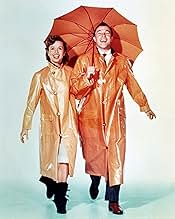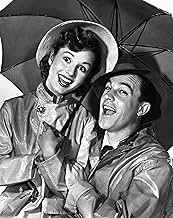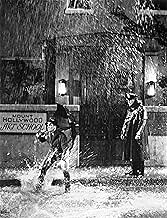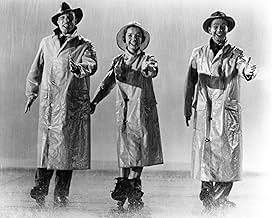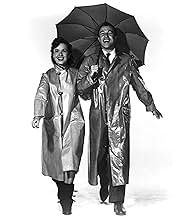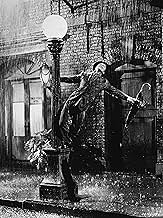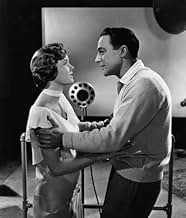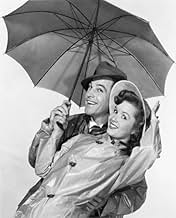A silent film star falls for a chorus girl just as he and his delusionally jealous screen partner are trying to make the difficult transition to talking pictures in 1920s Hollywood.A silent film star falls for a chorus girl just as he and his delusionally jealous screen partner are trying to make the difficult transition to talking pictures in 1920s Hollywood.A silent film star falls for a chorus girl just as he and his delusionally jealous screen partner are trying to make the difficult transition to talking pictures in 1920s Hollywood.
- Directors
- Writers
- Stars
- Nominated for 2 Oscars
- 11 wins & 11 nominations total
Dawn Addams
- Teresa - a Lady-in-Waiting
- (uncredited)
John Albright
- Call Boy
- (uncredited)
Shirlee Allard
- Chorus Girl
- (uncredited)
Bebe Allen
- Chorus Girl
- (uncredited)
Sue Allen
- Chorus Girl
- (uncredited)
John Angelo
- Dancer
- (uncredited)
Marie Ardell
- Chorus Girl
- (uncredited)
David Bair
- Chorus Boy
- (uncredited)
Jane Bateman
- Chorus Girl
- (uncredited)
- Directors
- Writers
- All cast & crew
- Production, box office & more at IMDbPro
Summary
Reviewers say 'Singin' in the Rain' is a celebrated classic, praised for its charm, wit, and infectious energy. Gene Kelly's performance, especially in the title number, is lauded for its seamless blend of dancing, singing, and charisma. The supporting cast, including Debbie Reynolds and Donald O'Connor, is commended for their stellar performances and chemistry. The film's vibrant choreography, clever script, and memorable musical numbers are frequently celebrated. Despite minor criticisms about predictability and humor, it remains a beloved musical.
Featured reviews
10AlsExGal
Singin In the Rain is arguably the best movie musical of all time, not just because of the music but because of the entire package - the premise, the comedy, the characters - everything here works together to make you feel better any time you sit down to watch it. It's ironic that this movie was thrown together quickly to capitalize on the success of "An American in Paris", since the improvisational feeling of the movie is one of the things that makes it so much fun. Although this film is number ten on the top 100 films of all time as compiled by the American Film Institute, it wasn't nominated for best picture the year of its release, 1952. Although it did well at the box office, it would be over twenty years before people would look back and realize just what a great motion picture it was. Perhaps that was because the 1970's were such bleak and cynical years, with movies that largely matched that mood, that people were eager to rediscover the fun that a motion picture viewing experience could be.
The movie focuses on that period of time in which the entire motion picture film industry was in nervous transition from silent to talking pictures. Although the movie compresses time in this respect - the transition actually took about three years - it does accurately describe the technical problems of that era along with their comical aspects. There was an overabundance of musicals in the first batch of talking films, many stars did have heavy accents that made their speech undecipherable or voices that came across like nails on a chalkboard like Lina Lamont (Jean Hagen) and saw their careers ruined, and early sound technology itself was so fragile that you would often see actors speaking to potted plants or to coat racks with comic effect. The preview of silent picture team Lockwood and Lamont's first talkie, "The Dueling Cavalier", is one of the most hilarious scenes in the film. It is pretty typical of what you would see in such an early talking picture - dialogue going in and out of sync, actors and actresses strutting around and wildly gesturing as if nobody can hear them, and dialogue that still resembled what you would read off of the title cards in a silent film - "I love you, I love you, I love you".
All of this is one of the reasons Singin' In The Rain will never get dated - it is a comic nostalgic look at a very narrow period in time. This movie is fun outside of its comic take on movie history, though. For one, it's hard to say who steals the show the most, since there are so many thieves involved. Most notably there is Jean Hagen - who actually has a very pleasant speaking voice - as the evil silent star who can't accept her days are numbered. Then there is a 27 year-old Donald O'Connor as Cosmo, the studio music director and sidekick of Gene Kelly's character whose youthful exuberance really shines in the number "Make 'Em Laugh" along with all of his goofy facial expressions. He seems to be having as much fun as the audience. Finally, there are all of the great dance numbers and music, capped by probably one of the most famous scenes of all time - Gene Kelly's rendition of the title number that perfectly captures the joy of a man who has just fallen in love and feels he has the world at his feet. You just can't watch this film and not come away with a smile on your face. It is as good for the soul as chicken soup, just a lot more fun.
The movie focuses on that period of time in which the entire motion picture film industry was in nervous transition from silent to talking pictures. Although the movie compresses time in this respect - the transition actually took about three years - it does accurately describe the technical problems of that era along with their comical aspects. There was an overabundance of musicals in the first batch of talking films, many stars did have heavy accents that made their speech undecipherable or voices that came across like nails on a chalkboard like Lina Lamont (Jean Hagen) and saw their careers ruined, and early sound technology itself was so fragile that you would often see actors speaking to potted plants or to coat racks with comic effect. The preview of silent picture team Lockwood and Lamont's first talkie, "The Dueling Cavalier", is one of the most hilarious scenes in the film. It is pretty typical of what you would see in such an early talking picture - dialogue going in and out of sync, actors and actresses strutting around and wildly gesturing as if nobody can hear them, and dialogue that still resembled what you would read off of the title cards in a silent film - "I love you, I love you, I love you".
All of this is one of the reasons Singin' In The Rain will never get dated - it is a comic nostalgic look at a very narrow period in time. This movie is fun outside of its comic take on movie history, though. For one, it's hard to say who steals the show the most, since there are so many thieves involved. Most notably there is Jean Hagen - who actually has a very pleasant speaking voice - as the evil silent star who can't accept her days are numbered. Then there is a 27 year-old Donald O'Connor as Cosmo, the studio music director and sidekick of Gene Kelly's character whose youthful exuberance really shines in the number "Make 'Em Laugh" along with all of his goofy facial expressions. He seems to be having as much fun as the audience. Finally, there are all of the great dance numbers and music, capped by probably one of the most famous scenes of all time - Gene Kelly's rendition of the title number that perfectly captures the joy of a man who has just fallen in love and feels he has the world at his feet. You just can't watch this film and not come away with a smile on your face. It is as good for the soul as chicken soup, just a lot more fun.
One thing I noticed in reading the comments of this movie is that nobody recognized the screenplay by Betty Comden and Adolph Green. Without their screenplay the movie does not get made. It is a great script that was made better by Gene Kelly and Stanley Donens' fluid direction. Everything in this movie glides effortlessly. Throw in dancing by Donald O'connor, Debbie Reynolds, Cyd Charisse and of course Gene Kelly, Great songs and the willingness of producer Arthur Freed to let the creative people to do their thing and you have a classic.
Singin' in the Rain is one of the best movies ever made. The film is beautiful, tuneful, and loads of fun. While it pokes fun at Hollywood it also does so with great love. Little bits and pieces of Hollywood lore find their way into this great film and it's a pleasure to get the joke or recognize the real star they're referring to.
The star trio is just perfect: Gene Kelly give a funny performance as the hammy silent actor; Donald O'Connor makes the most of his "second banana" role; Debbie Reynolds is perfect as the ingénue trying to break into films.
The three stars perform many memorable numbers, including Kelly's "Singin' in the Rain" classic; all three in the "Good Mornin'" number; O'Connor's "Make 'Em Laugh"; and Kelly and Reynolds in "You Were Meant for Me." The masterpiece however may be the "Gotta Dance" production number with Kelly and Cyd Charissejust perfect. Also great fun are O'Connor and Kelly in "Fit as a Fiddle" and "Moses Supposes."
There are of course other production numbers, including the montage that shows Hollywood's race to transition to talkies, a scene that ends in the "Beautiful Girl" number featuring Jimmy Thompson.
Jean Hagen (as Lina Lamont) won an Oscar nomination and steals the film in a classic comedy performance. Also good are Millard Mitchell, Douglas Fowley, Rita Moreno, King Donovan, Kathleen Freeman, Mae Clarke, Julius Tannen, and Madge Blake.
The great trick to this film is that while Reynolds is supposedly "lip syncing" for Hagen, it's really Hagen's voice that Reynolds is miming to as in the "I Would, Would You" number. The final miming act is Hagen mouthing "Singin' in the Rain" is really Reynolds. It gets so confusing you can't tell who is lip syncing whose voice.
Lots of Hollywood lore retold in this film. Hagen's Lamont character is a veiled reference to Norma Talmadge, who supposedly failed in talkies because of her New York accent. It's also a reference to Louise Brooks, whose talkie debut in The Canary Murder Case was all dubbed. When Kelly screams "I LOVE YOU" it's a reference to John Gilbert in is talkie debut flop. His Glorious Night. Kathleen Freeman's diction coach character is a reference to Constance Collier, who returned to Hollywood as a coach. And on it goes.
A great film!
The star trio is just perfect: Gene Kelly give a funny performance as the hammy silent actor; Donald O'Connor makes the most of his "second banana" role; Debbie Reynolds is perfect as the ingénue trying to break into films.
The three stars perform many memorable numbers, including Kelly's "Singin' in the Rain" classic; all three in the "Good Mornin'" number; O'Connor's "Make 'Em Laugh"; and Kelly and Reynolds in "You Were Meant for Me." The masterpiece however may be the "Gotta Dance" production number with Kelly and Cyd Charissejust perfect. Also great fun are O'Connor and Kelly in "Fit as a Fiddle" and "Moses Supposes."
There are of course other production numbers, including the montage that shows Hollywood's race to transition to talkies, a scene that ends in the "Beautiful Girl" number featuring Jimmy Thompson.
Jean Hagen (as Lina Lamont) won an Oscar nomination and steals the film in a classic comedy performance. Also good are Millard Mitchell, Douglas Fowley, Rita Moreno, King Donovan, Kathleen Freeman, Mae Clarke, Julius Tannen, and Madge Blake.
The great trick to this film is that while Reynolds is supposedly "lip syncing" for Hagen, it's really Hagen's voice that Reynolds is miming to as in the "I Would, Would You" number. The final miming act is Hagen mouthing "Singin' in the Rain" is really Reynolds. It gets so confusing you can't tell who is lip syncing whose voice.
Lots of Hollywood lore retold in this film. Hagen's Lamont character is a veiled reference to Norma Talmadge, who supposedly failed in talkies because of her New York accent. It's also a reference to Louise Brooks, whose talkie debut in The Canary Murder Case was all dubbed. When Kelly screams "I LOVE YOU" it's a reference to John Gilbert in is talkie debut flop. His Glorious Night. Kathleen Freeman's diction coach character is a reference to Constance Collier, who returned to Hollywood as a coach. And on it goes.
A great film!
Everybody knows Gene Kelly singing and dancing in the films title number, but this is just one of the many magical musical numbers in this epic piece of blissful entertainment. Set during the turbulent period when Hollywood was converting from silent films to sound, Singin' in the Rain' is a perfect example of everything that is good and right about movie-making. Gene Kelly in his greatest role is an all singing, all dancing sensation and his acting is pretty damn good too. Donald O'Connor excels as his exuberant sidekick and almost steals the show with the unsurpassed Make em Laugh'. Debbie Reynolds is feisty and sexy as Kelly's love interest, while Jean Hagen gives one of the screen's greatest supporting performances as the horrid Lena Lamont, a silent screen goddess whose voice will just not cut it in talkies.
The musical numbers flow fast and furious as Gene and Donald perform amazing feats of choreography with Fit as a Fiddle' and Moses Supposes' while Good Mornin' will have you dancing in the aisles. If Singin' in the Rain' had no musical numbers it would still be a contender for the funniest film ever made. The problems with experiments with sound films are painfully funny, and Kelly's silent sparring with the demonic Hagen is hilarious. The accolade of sheer perfection can be conferred on few films, and such a title is perhaps even an understatement in this case. And never before did rain look like so much fun.
The musical numbers flow fast and furious as Gene and Donald perform amazing feats of choreography with Fit as a Fiddle' and Moses Supposes' while Good Mornin' will have you dancing in the aisles. If Singin' in the Rain' had no musical numbers it would still be a contender for the funniest film ever made. The problems with experiments with sound films are painfully funny, and Kelly's silent sparring with the demonic Hagen is hilarious. The accolade of sheer perfection can be conferred on few films, and such a title is perhaps even an understatement in this case. And never before did rain look like so much fun.
Many good things can be and have been said about this one and they're all true. It's a great movie. The title number gives us Don Lockwood (Kelly)...In love as no other person has ever been in love, no doubt. He steps out the door and it's raining but he's oblivious to the rain. Who needs an umbrella when you've got wings on your heart and on your feet? Not the incomparable Gene Kelly as he treats us to THE single finest moment in the history of cinema. Do not miss this one.
Storyline
Did you know
- TriviaFor the "Make 'em Laugh" number, Donald O'Connor revived a trick he had done as a young dancer: running up a wall and completing a somersault. The number was so physically taxing that O'Connor ended up in a hospital bed for a week after its completion. He suffered from exhaustion and carpet burns. After an accident ruined all of the initial footage, O'Connor agreed to do the difficult number all over again.
- GoofsDuring the Cyd Charisse nightclub dance number, when she's wrapped around Gene Kelly, her body completely changes position between frames due to a clumsy edit. According to commentary on the special edition DVD, this cut of only a few frames' duration dates back to the original release of the film and no one knows why it exists.
- Quotes
Cosmo Brown: Lina. She can't act, she can't sing, she can't dance. A triple threat.
- ConnectionsEdited from The Three Musketeers (1948)
- SoundtracksFit as a Fiddle
(1932)
Music by Al Hoffman (uncredited) and Al Goodhart (uncredited)
Lyrics by Arthur Freed
Originally from the 1932 stage revue "George White's Music Hall Varieties"
Sung by Gene Kelly (uncredited) and Donald O'Connor (uncredited)
Details
- Release date
- Country of origin
- Language
- Also known as
- Cantando bajo la lluvia
- Filming locations
- Metro-Goldwyn-Mayer Studios - 10202 W. Washington Blvd., Culver City, California, USA(New York City Streets)
- Production company
- See more company credits at IMDbPro
Box office
- Budget
- $2,540,800 (estimated)
- Gross US & Canada
- $1,884,537
- Opening weekend US & Canada
- $13,643
- Nov 10, 2002
- Gross worldwide
- $2,095,646
- Runtime1 hour 43 minutes
- Color
- Sound mix
- Aspect ratio
- 1.37 : 1
Contribute to this page
Suggest an edit or add missing content








